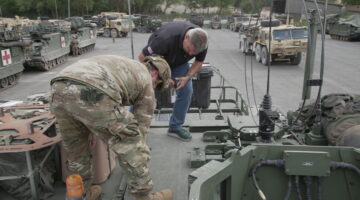
BELFAST — British Royal Marines are to receive a fleet of six amphibious support ships capable of carrying drones, larger aircraft and insertion craft, the Royal Navy said today.
The new vessels, which sit under the Ministry of Defence’s (MoD) Multi Role Support Ships (MRSS) program, are set to replace HMS Albion and HMS Bulwark — the navy’s existing amphibious flagships from 2033/2034 — three other Bay-class platforms, and support ship RFA Argus, according to a statement from the service.
In addition to carrying heavy duty vehicles and aircraft, the future ships can also be operated as casualty receiving vessels, offering urgent medical care to sailors.
Lawmakers had been concerned that both HMS Albion and HMS Bulwark would be scrapped before reaching their 2033 out of service date, reportedly to allow sailors to transfer to other ships, amid recruitment problems, but the MoD eventually decided in January that they would not be retired prematurely.
It remains to be seen when an order for the MRSS fleet will be placed, and a total cost for the program has yet to be decided, but the Royal Navy statement noted that the MoD has started a first (concept) stage, and plans on collaborating with industry “as part of early market engagement ahead of developing the vessel design.”
The MRSS “procurement strategy will be set following conclusion of the concept phase,” said a MoD spokesperson in a statement to Breaking Defense, adding that market engagement is expected to start in the fourth quarter of 2024.
“All Royal Navy warships are designed to meet Naval survivability standards, as a minimum to protect our sailors and marines,” explained the spokesperson. “Beyond that, the ongoing concept phase is considering cost and capability trade-offs within a set of key user requirements and wider fleet assumptions.”
Britain has a select pool of shipbuilders to call upon for the MRSS acquisition, namely; Babcock, BAE Systems, Camell Laird, and Harland and Wolff.
A spokesperson for BAE Systems said, “We welcome the announcement that the Multi Role Support Ships programme will proceed. We have a long history of supporting Royal Navy shipbuilding, combat systems and radar programmes and we look forward to working with the UK Ministry of Defence and industry partners on the next phase of the programme.”
Harland and Wolff, based in Belfast, Northern Ireland, is currently under contract to deliver three Fleet Solid Support (FSS) ships for the Royal Navy, after securing a £1.6 billion ($2 billion) contract in January 2023. The vessels are designed to provide munitions and stores to Royal Navy aircraft carriers, destroyers and frigates when deployed at sea. The shipbuilder had not replied to a request for comment about MRSS at the time of publication.
Among other big ticket naval programs under contract, London is investing in new Type 26 and Type 31 frigates.
Reflecting on the decision to add the six MRSS ships to 22 other Royal Navy vessels on order or in build, UK Defence Secretary Grant Shapps said, “this is a golden age for British shipbuilding,” during a speech today at the annual Sea Power Conference in London, England.
The acquisition, he added, is “backed” by the recent announcement to increase UK defense spending by 2.5 percent GDP by 2030, though such a plan remains subject to the Conservative Party winning a general election, due to be called in the second half of the year.
Polls, however, show that the Labour Party is on course for victory and a return to power after 14 years in opposition.
In a report published on Monday, the Council on Geostrategy, a British think tank, said that the UK “does not have enough naval capabilities” to protect British and NATO interests in the Euro-Atlantic region amid Russian threats, or to adequately “contribute towards sea denial in the Indo-Pacific to deter” China.
If those two targets are to be realized, the Royal Navy must “increase lethality, greater mass, survivability and integration” while investment should seek to “ensure the maximum potential of Britain’s aircraft carriers,” by ordering more US F-35B fifth generation fighter jets, according to the report.

